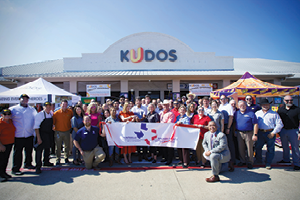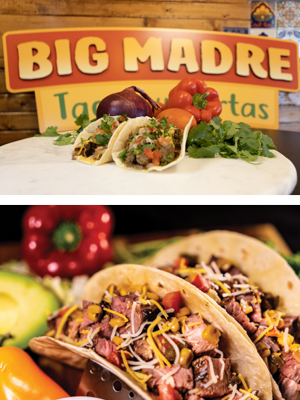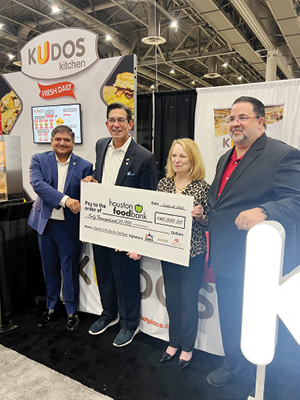Brian Trout, the CEO of the Greater Houston Retailers Cooperative Association (GHRA) says his organization is “one of the best-kept secrets in retail”—and thinks it’s time the secret got out.
“[In Houston, Texas,] we’re the fourth-largest market in the U.S.,” he said. “We represent close to 40% of the [c-store] marketplace where we operate. And people don’t know about us.” Trout thinks part of the reason the organization has had success is because Houston is a huge independent market that, as a result, large national retailers have found difficult to permeate.
GHRA has over 1,100 members and 2,100 independent convenience stores in 37 counties in southeast Texas. The organization has around 240 employees, about 30 at the corporate level and the majority in its warehouse.
Associations and cooperatives are common in the c-store and fuel retailing industry. The basic concept is easy to understand: strength in numbers.
“We are the largest buying group in the industry in Houston,” Trout said. “So all the vendors, they want to get their product on our shelves. They know that we’re kind of like a Walmart, if you will, from an outlet perspective, and [the vendors] recognize that, and they lean in on it.”

Hussain Karovalia, who owns six convenience stores and seven smoke shops and has been a member of GHRA since 2003, said he joined the organization because it brings all the vendors to one place. That allows him to get bargains on rebates and promotions that he can use to drive sales.
Karovalia also said GHRA provides negotiating power, which gives him an advantage against competing businesses. The organization also helps him stay up-to-date with the market, negotiates with local entities and agencies on his behalf and makes it easier to obtain and maintain licenses and permits.
“GHRA thrives, I would say, because of helping individual mom-and-pop stores to better leverage things,” Karovalia said, adding that the organization is “a group effort that helps the individual at the end of the day.”
The GHRA board of directors are active members of the cooperative who volunteer their time—limited three-year terms—to serve the larger community of association members.
Tanvir Ali, the former honorary secretary of GHRA’s board of directors and current advisor to the board, said the core value of GHRA is “the sheer negotiation advantage that you receive as an independent operator by using GHRA, and that’s something that all of us on an independent basis would not be able to do. Our members span from a single store owner to a 100-plus store owner, yet when you have 2,000-plus stores in a negotiation agreement, it makes a substantial difference, as you can imagine.”
The organization is designed first and foremost to help the members compete in the marketplace.”
According to Imran Ali, the president of GHRA, “Being unified is the biggest strength that we have.”
He highlighted GHRA’s promotions and planograms on how to sell product and maximize revenue within a particular cooler door, and its access to service agreements (particularly insurance) and electricity aggregations that individual stores or small groups don’t have access to.
Five Platforms
“The organization is designed first and foremost to help the members compete in the marketplace,” Trout said. “Independent operators are wearing every functional hat under the sun, and GHRA provides resources across several of those functions to support our members’ ability to operate, keep cost of goods low and grow their businesses.”
For what Trout called a “nominal membership fee each year,” GHRA gives back “oodles of money” to its members (forecasted in 2024 to be close to $30 million this year—which works out to an average of nearly $15,000 per store).
There are five key platforms that define GHRA and how the organization provides value.
All members are required to participate in the first platform: the direct service delivery (DSD) platform, where the organization negotiates space allocation and rebates for shelf space by vendor, negotiates supply and commercial marketing agreements with vendors and conducts product assessment management. The association also puts on monthly promotional campaigns and a variety of extra programs members can participate in. The remaining platforms are optional.
In 2016, GHRA rolled out its second platform, the warehouse—which Trout said “adds a significant competitive advantage”—and kicked it off in earnest in 2019 when the organization became a direct stamper of cigarettes (becoming the first group in Texas in 23 years to hurdle those requirements).
“All the profits that a grocery supplier would make on cigarettes, we now pass those on to our members,” Trout said.
The third platform GHRA offers is a foodservice program—Big Madre Tacos y Tortas—and the fourth is its first Kudos convenience store concept. (Both are explored later in this article.)
Finally, GHRA has a fuels platform that kicked off last year when the organization started delivering fuels.
“The whole idea is to aggregate, as best we can, our members’ purchases of fuel so that we can pass on the cost savings that the middleman is getting today,” Trout said.
GHRA continues to try to add services that are important to its members. The organization advocates for its members, partners with a variety of vendors to support community events, engages with the city’s mayor and task forces, tries to shape policy and laws, leans in heavily with trade associations and supports advocacy groups.
Keeping It Running
With 2,100-plus c-stores in the organization, communication is key, according to Trout. So GHRA conducts town hall meetings with its members around the counties the organization operates in, educating members on what changes are coming, what the rebate structures will look like the following year, what the reset schedule is (and who will be doing it) and what their planograms and promotional activities will be for the year.

The organization has member service representatives who visit stores monthly and who help operators stay compliant with commercial marketing agreements. Over a year ago, GHRA created a call center to better serve its members.
Trout shared that GHRA employees also sit down quarterly with vendors and conduct a business review, asking questions such as: How’s it going? Where are some opportunities, and what can we do next? How do we enhance value? What are some of the challenges we need to dive in on and try to overcome? How can we help you sell more stuff tomorrow than you did today?
Cooking Up Success
Two ways GHRA is helping its members and growing the organization are through its Big Madre Tacos y Tortas offering and Kudos, its new concept store, the first of which launched in September 2023.
“With all the competitors coming into our market, specifically in the Houston surrounding areas, we need to set ourselves apart,” Imran said. “We want to kind of align all of our members to make sure that if we need to compete against any of these big players or competitors, we’re all on the same page.”

Big Madre Tacos y Tortas is a Tex-Mex brand that was developed in-house by GHRA and that can be added to any member store. It was designed to make things easy on store operators—a couple of people can manage the whole kitchen. And while the proteins are cooked in-store, the produce and other items are prepackaged and delivered in ready-to-use fashion.
GHRA licenses the offering to its members. The contractual relationship includes buying from GHRA’s authorized vendors. The organization does the advertising and manages Big Madre Tacos y Tortas on Uber Eats and DoorDash.
At the moment, GHRA has 38 Big Madre Tacos y Tortas locations, with 16 others in the pipeline.
The Kudos concept came from a similar desire for GHRA to compete on a larger scale. Kudos is a gas station, c-store and kitchen built around three things: a delicious, high-quality food and beverage program designed to position the store as a restaurant destination; customer connection; and improving local communities through work on various social causes.
In a press release announcing the Kudos launch, Trout said the store’s customers “are good, honest people, and we want to celebrate them and treat them like the heroes that they are. We are determined to make people feel good when they walk into our stores and to improve the communities we serve.”
Hand-breaded chicken tenders and chicken sandwiches are Kudos’ main offerings, but the store also offers breakfast items, including biscuits, as well as tacos, wraps, salads and bakery items. Kudos will offer a line of private-label sweets and snacks from local artisans and will include a full-service espresso bar.
While some stores might offer the full Kudos platform, GHRA is looking into developing Kudos-lite stores.
Trout said the Kudos kitchen is a “high-brow food offering that is very, very good” that “may evolve into something more robust.”
The organization partnered with Impact 21 on brand development and is leaning on industry experts to formulate and develop the Kudos offering. The Kudos platform has adopted a coffee barista program, and GHRA is looking into remodels and adding new-to-industry stores.
While some stores might offer the full Kudos platform, GHRA is looking into developing Kudos-lite stores that come with the food platform but may not be what Trout called “the full monty,” with a barista, freshly squeezed lemonades, teas, etc., because of space or equipment constraints.
Trout’s goal is to rapidly grow Kudos in the greater Houston area within the next few years.
“If we grow Kudos in the future as we plan, that will make us the largest branded group in Houston,” he said. “We are very large anyway—we saturate the market with our network—but the consumers don’t know us the way that the vendors do, so the Kudos brand is a way for us to communicate with the consumer and try to drive additional repeat traffic to the stores, sophisticate the offers, provide intelligence around consumer behavior and promotional activity, leverage technology and more.”
Naveed Ali, a GHRA board member who owns numerous convenience stores with different partners, said, as of press time, he was launching a Kudos store in New Caney, Texas, in January 2024.
“What made me open [the store] is because I believe [the Kudos] concept was missing,” Naveed said. “The whole concept came along three years back with the thought that, ‘Hey, we need our own brand that can stand up against chain-like stores.’”
Trout hopes Kudos can achieve that for GHRA. At the moment, “with 2,100 disparate branded locations, there’s no one voice.”
Naveed added, “This concept is for the multistore owners who can bring multiple stores under one concept. So I’m looking at it in a way that if I build one store … word will spread, and then we’ll have a domino effect.”
Fueling Growth
Where does GHRA want to go next?
Tanvir said, “The next big step for GHRA is: How do we take what we’ve grown for the last 25 years and leverage that and provide the same value to members on a national level?”
He highlighted the need for constant evolution: “If we’re not putting the right pieces in place for [our members], downrange, come five years or 10 years, competition—whether it be national or local—is going to provide a significant impact. For [our members] to compete, we need to be ahead of the game at all times.”
Part of keeping its members engaged, Trout said, is that growth. The organization is investing a lot in its warehouse and is refreshing its vehicles. The warehouse operation has been growing so quickly that GHRA is also looking for an additional warehouse space to expand into, and the space will become available to nonmembers.
“We could do a lot more if we had the right resources,” he said. “There’s no shortage of ‘Hey, we could do this’ or ‘Hey, we can do that.’ Everybody’s leaning in and coming up with ideas. You can’t advance every idea, so it’s probably more important to say what we won’t do than it is to say what we will do, because the ideas are just tremendous.”
It’s an evolution and a journey, not a sprint, but we’ve got some pretty audacious goals.”
GHRA’s board has a number of younger members who are focusing on concepts such as technology, data utilization, AI, machine learning and automated replenishment to help streamline operations and take costs out of the system.
Because GHRA licenses its brands and doesn’t franchise them, the Big Madre Tacos y Tortas and Kudos offerings have high potential for rapid growth. The organization is looking into expanding both beyond its members—with a goal of 150-200 Big Madre Tacos y Tortas and 200-300 Kudos stores under GHRA’s umbrella over the next few years.

“We’re leaning in and continuing to add value to the membership,” he said. “Our net trajectory is growth, right?”
GHRA’s fuel program is going to be a “huge” focus for the organization, according to Trout, and is expected to grow rapidly over the next few years.
“It’s kind of the chicken and the egg thing,” Trout said. “Our members are not contractually required to buy fuel from us. We’re working to set up those fuels supply commercial contracts because it’s commercially advantageous for them, which will help us buy better, which in turn gets them better pricing because we pass all the profits on to the members.”
He added: “It’s an evolution and a journey, not a sprint, but we’ve got some pretty audacious goals.”